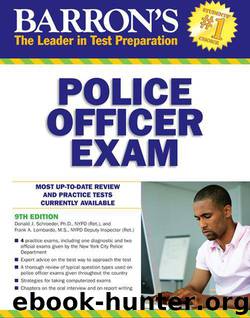Police Officer Exam (Barron's Police Officer Exam) by Schroeder Ph.D. Donald & Frank M.S. Lombardo

Author:Schroeder Ph.D., Donald & Frank, M.S. Lombardo [Frank, M.S. Lombardo]
Language: eng
Format: epub
Publisher: Barron's Educational Series
Published: 2013-03-31T21:00:00+00:00
r. Learn/Teach
Learn means to get knowledge.
I learn something every time I speak to my dad.
Teach means to give knowledge.
My Dad teaches me something every time he speaks to me.
s. Moral/Morale
Moral means good or virtuous conduct.
Giving the money back was a very moral act. as you do the practice questions.
Morale means spirit or the mood of someone or of an organization.
The morale among the several hundred officers was high.
t. Practical/Practicable
Practical means useful, workable, sensible, not theoretical.
Keeping a spare set of keys to the police van is a practical idea.
Practicable means that something is possible or feasible. It is capable of being put into practice.
The plan to round up the suspects was practicable.
u. Their/They’re/There
Their shows possession relating to the word they.
They ate in their radio car.
They’re means “they are.”
They’re very happy.
There means a location.
The police officers never searched there.
v. To/Too/Two
To means in a certain direction.
Detective Cane went to the laboratory.
Too means also or more than as you do the practice questions.
Don wanted to go, too, but it was too hot.
Two is a number.
There are two officers in each radio motor patrol car.
w. Which/Who
Which is used to refer to one or more of a group, generally in a question.
Which rope was used by the inmate?
Who is used to refer to people.
The inmate who escaped last week was captured by the police.
x. Whose/Who’s
Whose shows possession relating to the word who.
The police officer could not identify whose shoes were thrown from the rooftop.
Who’s means “who is.”
Who’s using all the soap powder?
y. Your/You’re
Your shows possession relating to the word you.
You had better drop your weapon.
You’re means “you are.”
You’re surrounded.
2. Remember, if a verbal usage error is found in a choice, mark that choice as not correct and go on to the next choice. Once an error is found in a choice, you need not continue to examine that choice.
3. Circle the part of a choice that contains incorrect word usage. This is important so that when reviewing the examination, it will quickly become evident why the choice was believed to not be the correct one.
4. Examine all the choices and use a process we refer to as deselection. This means that it is not enough to believe that a certain choice contains no verbal usage errors; rather, such belief should be corroborated by finding the verbal usage errors in the other remaining choices.
TYPE B QUESTIONS—EXPRESSING POLICE INFORMATION
In this question type you are given a series of facts about a police incident and asked to select the choice which most accurately and clearly presents these facts in paragraph form. The kind of information you are given usually includes information about the names of people, such as victims, witnesses, and suspects, and their addresses, as well as information about when the incident occurred, where it occurred, and a brief description of what happened.
Recommended Strategy
1. Bear in mind that the correct answer is the one that is accurate and clear. Accuracy is checked by making sure your selected answer correctly presents the information supplied. Clarity is determined by a logical presentation of the information in the most correct grammatical form.
Download
This site does not store any files on its server. We only index and link to content provided by other sites. Please contact the content providers to delete copyright contents if any and email us, we'll remove relevant links or contents immediately.
1,001 ASVAB Practice Questions For Dummies by Powers Rod(4038)
ASVAB For Dummies by Powers Rod(2460)
Police Exams Prep 2018-2019 by Kaplan Test Prep(2032)
Churchill by Paul Johnson(2012)
Wiley CPA Examination Review Focus Notes by Kevin Stevens(1613)
Wonder by R J Palacio(1601)
First Aid Handbook--Crucial Survival Skills, Emergency Procedures & Lifesaving Medical Information by Department of the Army(1506)
1936941139 (N) by Bob Rosenthal(1502)
A Very Stable Genius by Philip Rucker & Carol Leonnig(1334)
ASVAB AFQT For Dummies by Rod Powers(1319)
1,001 ASVAB AFQT Practice Questions For Dummies by Angie Papple Johnston(1176)
U.S. Army Combat Pistol Training Handbook by Army(1143)
CISSP For Dummies by Miller Gregory Peter(1134)
The GED Crash Course by Alpha(1110)
Court Officer Exam by Learning Express LLC(1062)
McGraw-Hill Education 2,000 Review Questions for the CPA Exam by Denise M. Stefano(1057)
Master the Civil Service Exams by Peterson's(1054)
Master the ASVAB by Scott Ostrow(1051)
Future Design by Unknown(1015)
